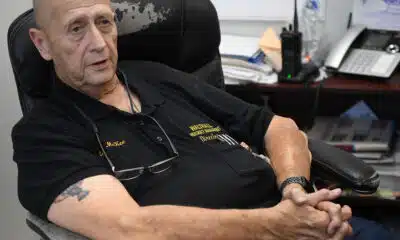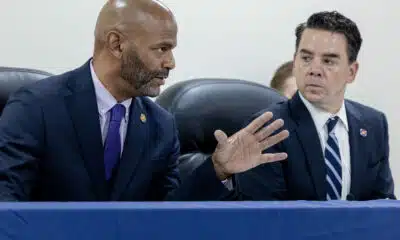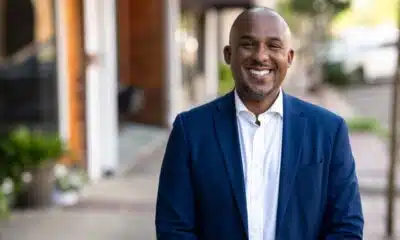Mississippi News
USM, welfare scandal: ‘What other secrets lie below the surface?’
As USM speaks on welfare scandal, students and faculty ask ‘what other secrets lie below the surface?’
The University of Southern Mississippi broke its silence on its role in the unfolding welfare scandal on Thursday after members of the faculty senate executive committee presented a draft of a blistering letter last week to the new president, Joe Paul, and the interim provost.
At a meeting Friday, when the senate had been planning to adopt the draft letter, many faculty grumbled about the university’s preemptive statement, calling it a confusing attempt to shift blame in the welfare scandal. Some faculty said they were just as bewildered by the reply from the Mississippi Department of Human Services to that statement.
“It’s sort of like seeing through the fog, and you can kind of make out some shape but you can’t see all the details,” Max Grivno, a history professor who represents the School of the Humanities on the senate, told Mississippi Today.
As former NFL quarterback Brett Favre and the volleyball stadium continue to make national news, officials at USM have refused requests for comment on the scandal from Mississippi Today and other media outlets like CNN and SM2, the student newspaper.
USM’s statement Thursday said that the university had “engaged in this agreement in good faith, following thorough due diligence by outside legal counsel, and after multiple assurances from officials at the highest levels of MDHS.” The statement did not say if USM intends to repay the welfare funds, but said it is working on a proposal to allow MDHS to use space on campus to provide programming for the underserved community.
MDHS responded it could not enter an agreement with USM to use the property in lieu of repayment of the funds “because we believe it to be a continued violation of the law and the purpose of the TANF program to help lift needy families out of poverty.”
In response, the faculty senate on Friday decided to hold its statement and amend it at a soon, but yet to be scheduled, emergency meeting.
At the same time, IHL Board President and billionaire USM alum Tommy Duff is also speaking up, saying USM should pay the money back and that the deal was “stupid,” even if legal, Mississippi Today reported Thursday.
His comments followed an editorial published last month in SM2 that also called on USM to return the misspent welfare dollars.
“The scandal is killing Favre’s reputation and it’s taking USM down with it,” the editorial states. “It’s hard to understand why Favre completed these actions, however the solution seems simple enough: Someone needs to give back the money.”
In 2017, Favre and USM officials crafted a deal with the Mississippi Department of Human Services and a welfare-funded nonprofit to use $5 million in Temporary Assistance for Needy Families (TANF) funds to build a volleyball facility on campus – a violation of federal law, according to State Auditor Shad White and state prosecutors.
White officially questioned the purchase in May of 2020, and while it has resulted in a criminal fraud charge against one defendant in the welfare scandal, neither the state nor federal government has taken further action to claw back the money or hold others accountable.
Mississippi Community Education Center, a nonprofit founded by Nancy New, a key figure in the welfare scandal, paid the athletic foundation to build the volleyball stadium under the guise that the nonprofit would lease university property to provide anti-poverty programming to the area’s underserved community.
USM told Mississippi Today in February of 2020 that the athletic foundation was looking forward to beginning conversations about how to use university property to serve the needy, but nearly three years later, the university says it is only now working on a proposed partnership with MDHS to fulfill this mission, which now appears unlikely given the welfare agency’s recent statement.
The SM2 editorial questioned if the volleyball project, first uncovered by Mississippi Today in February 2020, is an isolated event.
“What other corruption has been swept under the rug by those who are supposed to have good intentions for the university,” the editorial reads. “What other secrets lie below the surface?”
While the volleyball stadium has dominated headlines, it wasn’t the university’s only project supported by welfare dollars.
By the time USM officials began talking with New about funding the volleyball building in July of 2017, they had already entered a similarly structured lease agreement that funneled $200,000 in federal MDHS grant funds to renovate a space inside the Jim and Thomas Duff Athletic Center called the M-Club Room, an area for student athletes.
In the days after Favre and the welfare officials initially met at USM to discuss funding for the volleyball stadium, USM officials expressed apprehension about taking $4 million in grant funds for the project, according to texts Favre sent Nancy New. But somewhere within the negotiations, texts show, the deal rose to $5 million, including an additional $1 million for improvements to the basketball stadium and facility maintenance costs.
In the aftermath of the scandal, the university has not acknowledged these additional benefits it received from the welfare program or responded to several inquiries about these arrangements.
The forensic audit found that the welfare department also paid USM nearly $840,000 in welfare funds for a “Healthy Choices Program” that violated TANF regulations. Mississippi Today retrieved documents through a public records request that show USM entered TANF grant agreements with both MDHS and Nancy New’s nonprofit from 2016-2019 for this program, called a “Student Development Program.”
The grant specifically targeted student athletes and beyond funding salaries, scholarships and departmental expenses, the university used the money for things like specialty performance drinks, popsockets and massages, according to Mississippi Today’s review of receipts.
The forensic audit also questioned nearly $1.2 million in welfare funds that New’s nonprofit paid the university to fund “externships” for students in the School of Psychology through a program that provided USM student workers to New’s for-profit school.
USM also received $231,986 through Families First for Mississippi – the name of the nonprofit-operated welfare program during the scandal – with the goal of helping fifth-graders develop healthy eating habits. Auditors did not question this program, called the “RISE program” and funded by nonprofit Family Resource Center of North Mississippi.
The nutrition program shared a name with another program funded by the same nonprofit, former WWE wrestler Ted “Teddy” DiBiase’s RISE Program, which led to federal charges against former MDHS Director John Davis.
At last month’s faculty senate meeting, Wiesenburg, the president, suggested they should write a letter to USM’s administration. At most universities, faculty senators are representative bodies made up of faculty elected by each department. The administration is supposed to seek the faculty senate’s feedback on a range of policies that affect the university from teaching and learning to the search for a new president. This is called shared governance.
Wiesenburg’s suggestion prompted an impassioned speech from Grivno who said he thought the statement should point out that the misspending was “a symptom of a deeper rot” – that the athletic foundation and the administration operate with little faculty oversight.
Grivno wouldn’t advocate for USM returning the funds to the state, he said, “because they will just give it to another one of their cronies.”
“We should call attention to the fact that this happened because we had a breakdown of shared governance,” he added.
Grivno also noted the faculty senate’s exclusion from the presidential search process that led to Paul’s appointment. He noted that IHL’s search advisory group, which was stacked with administrators and high-level donors, did not include a single faculty senator.
“People scratch their heads and go, ‘how did this happen?’” Grivno continued. “It’s not an accident, it’s not an oversight. It was intentional. It’s offensive because it was meant to give offense. We can at least squeal like a stuck pig and say, ‘this wasn’t right.”
For nearly three years, university and IHL officials have been virtually mum about the volleyball controversy – a primary reason for the faculty letter. USM has not responded to several emailed requests for an interview or for comment on its welfare-funded projects since Mississippi Today first reported on the project in February of 2020.
The new, state-of-the-art volleyball stadium was the brainchild of Favre, whose daughter played the sport at USM. He began discussing the project with USM officials as early as 2016. During the years Favre was working to get the volleyball facility built, The Athletic reported that the athletic foundation took $130,000 in donations from Favre’s charity, Favre4Hope, which says its mission is to serve needy or disabled children and breast cancer patients.
By mid-2017, Favre was in touch with Gov. Phil Bryant, Bryant’s appointed welfare director John Davis and New, who was given authority to spend millions of federal welfare funds, about funding the volleyball stadium.
USM’s legal counsel and the welfare department decided that despite the federal prohibition on using welfare funds for brick and mortar construction, they could structure the payment as a lease between the athletic foundation and New’s nonprofit Mississippi Community Education Center.
USM, owner of university property, would lease its athletic facilities for a five-year period to the athletic foundation for $1, and the athletic foundation would turn around and lease the property to the nonprofit for $5 million. The leased property included the to-be-built volleyball facility, where the nonprofit said it would staff resource offices.
“It’s very difficult to make that argument in hindsight because the volleyball court had not yet been built,” White said in a September interview with ESPN. “So they were leasing a volleyball court at a very, very high rental rate before the volleyball court was built. That is not a lease. That is building something with welfare money, which you cannot do.”
USM sent the lease between USM and the athletic foundation, with the attached sublease between the athletic foundation and Mississippi Community Education Center, to Mississippi Institutions of Higher Learning, which has the final say over university contracts of $250,000 or more. IHL legal counsel from the Attorney General’s Office and IHL’s Board of Trustees then approved the lease.
In May of 2020, Mississippi Today retrieved meeting minutes showing that the IHL Board of Trustees approved a lease for the purpose of building the volleyball stadium – what officials called a “Wellness Center” – knowing, according to meeting minutes, that “MCEC’s funding for this project is via a Block Grant from the Mississippi Department of Human Services.”
Tom Duff, who sat on IHL’s board and now serves as its president, told Mississippi Today Thursday that he did not know about the volleyball project even though he voted on it, because it had been placed on the consent agenda – a block of agenda items that the trustees vote on all at once and often don’t read.
“The funding from MCEC shall be prepaid rent to the Foundation in the amount of Five Million Dollars ($5,000,000) for the leasing of certain USM athletic facilities including but not limited to the to be constructed Wellness Center, Reed Green Coliseum and additional athletic space as agreed upon by USM and the Foundation,” the minutes state.
Mississippi Today attempted to get IHL to respond to the revelation in 2020, but officials insisted that IHL only approved the $1 lease between the university and the athletic foundation, not the $5 million sublease between the athletic foundation and the nonprofit that was attached to it.
The implication was that IHL was not involved in the transfer of welfare funds between the nonprofit and the athletic foundation, even though the plan to use MDHS money to build the volleyball stadium was outlined in the minutes IHL approved.
After attempts from IHL and the university to obscure that fact, Mississippi Today sent an email to both entities stating, “Southern Miss knew and allowed Human Services funds to be used to construct its volleyball center. It did this by letting the foundation rent University property for $5 million. It’s in the October 2017 IHL meeting minutes and neither of you have disputed this.”
IHL Communications Director Caron Blanton doubled down.
“Given that you are determined to print inaccurate information, we are prepared to respond appropriately,” Blanton wrote. “The IHL Board gave USM the authority to lease land to the USM Athletic Foundation, a separate entity with its own board, for $1, period. If you are ‘comfortable’ reporting inaccurate and verifiably false facts, that is certainly your journalistic prerogative.”
“You have not disputed anything I am preparing to write,” Mississippi Today responded. “The IHL board gave USM the authority to lease land to the USM athletic foundation with the understanding that the foundation would then lease it to MCEC for $5 million in MDHS block grant funds to build a volleyball stadium. Therefore, the University and IHL knew that block grant funds would be used to pay for the facility.”
Blanton forwarded Mississippi Today’s email to IHL Commissioner Alfred Rankins, who replied, “There is no need to respond to (Mississippi Today) again regarding this issue,” according to an email the news organization obtained.
IHL never explained what was inaccurate about Mississippi Today’s interpretation of the meeting minutes, nor did it respond to the published story as warned. IHL did not respond to a request for comment for this story.
The volleyball stadium is the single largest known welfare expenditure within the scandal. Nancy New’s son Zach New pleaded guilty in April to defrauding the government for funneling welfare money to the project and disguising it as a lease. But the state chose not to include the volleyball stadium in its civil lawsuit filed in May that attempts to clawback the money.
After the scandal broke and the auditor officially questioned the volleyball stadium purchase in May of 2020, Duff, then an IHL board member, asked a lawyer friend, Joel Johnson, a member of the athletic foundation, to research events surrounding the project’s approval.
“Joel is very upset about the situation with the Mississippi Community Education Center and the lack of transparency with the USM Athletic Foundation and its members,” Duff wrote in an email to Commissioner Rankins. “What these minutes indicate to me is that there was no details of the transaction nor a vote on same. There is zero reference to a lease in this agreement.”
Duff and Favre are listed on the university’s website as honorary members of the athletic foundation’s board of directors, along with Hattiesburg lawyer Bud Holmes, who was representing Favre in the state’s civil case until Favre hired former Donald Trump attorney Eric Herschmann. The most recently available public IRS tax forms for the foundation, which are from 2020, also list Zach New as a member of the athletic foundation board.
Johnson declined to discuss the project with Mississippi Today, citing ongoing litigation.
In his email to Duff, Johnson said the only person to mention Nancy New’s nonprofit to the foundation was USM Athletic Director Jon Gilbert, who attended the July 2017 meeting about the project with Favre and Davis. Gilbert has declined interview requests from Mississippi Today since 2020.
“Shad White and I are having a conversation,” Duff wrote to Rankins in the same email more than two years ago, “and then I am visiting with US Attorney Mike Hurst to learn, if possible the state and federal response.”
“Thanks for sharing,” Rankins responded.
In an interview with Mississippi Today, Duff said he could not recall the specifics of his conversation with Hurst who left the Department of Justice in early 2021. Duff said he thinks he contacted Hurst before the scandal was public.
“If I remember the conversation, I think I just said, ‘Mike, I don’t know what is going on about this, but the athletic foundation was not aware of it, the IHL was not aware of it, and perhaps somebody needs to check into it,’” Duff said.
Duff said he is still trying to understand how the misspending happened but that the “key statement” is he thinks the athletic foundation was not aware of the sublease with Nancy New’s Mississippi Community Education Center.
The sublease with MCEC was signed by Athletic Foundation President Leigh Breal.
“You’re dealing with the foundation, you’re dealing with USM, you’re dealing with IHL, you’re dealing with the state,” Duff said. “I can be wrong in some of my specifics, that’s why I’m trying to couch myself. Something that I think is a fact might not be a fact. Basically me saying USM should pay back something – probably the foundation is the one that got the money, it’s just USM ended up with the building.”
Editor’s note: Mississippi Today Editor-in-Chief Adam Ganucheau’s mother signed off on the language of a lease agreement to construct a University of Southern Mississippi volleyball stadium. Read more about that here.
This article first appeared on Mississippi Today and is republished here under a Creative Commons license.
Mississippi News
Suspect in Charlie Kirk killing is charged with murder as prosecutor says DNA found on rifle trigger
SUMMARY: Tyler Robinson, 22, was charged with the murder of conservative figure Charlie Kirk, shot Sept. 10 at Utah Valley University. Robinson confessed via text to his partner and left a note expressing intent to kill Kirk, citing hatred. DNA linked Robinson to the rifle used. Prosecutors revealed Robinson planned the attack for over a week and targeted Kirk, a key conservative youth leader. Robinson’s political views shifted after dating a transgender man, causing family tensions. After the shooting, Robinson discarded evidence and urged his partner to delete texts. FBI investigates possible wider connections. Charges include murder with potential death penalty enhancements.
Read the full article
The post Suspect in Charlie Kirk killing is charged with murder as prosecutor says DNA found on rifle trigger appeared first on www.wjtv.com
Mississippi News
Suspect in Charlie Kirk assassination believed to have acted alone, says Utah governor
SUMMARY: Tyler Robinson, 22, was arrested for the targeted assassination of conservative activist Charlie Kirk in Orem, Utah. Authorities said Robinson had expressed opposition to Kirk’s views and indicated responsibility after the shooting. The attack occurred during a Turning Point USA event at Utah Valley University, where Kirk was shot once from a rooftop and later died in hospital. Engravings on bullets and chat messages helped link Robinson to the crime, which was captured on grim video. The killing sparked bipartisan condemnation amid rising political violence. President Trump announced Robinson’s arrest and plans to award Kirk the Presidential Medal of Freedom.
The post Suspect in Charlie Kirk assassination believed to have acted alone, says Utah governor appeared first on www.wjtv.com
Mississippi News
Americans mark the 24th anniversary of the 9/11 attacks with emotional ceremonies
SUMMARY: On the 24th anniversary of the 9/11 attacks, solemn ceremonies were held in New York, at the Pentagon, and in Shanksville to honor nearly 3,000 victims. Families shared personal remembrances, emphasizing ongoing grief and the importance of remembrance. Vice President JD Vance postponed his attendance to visit a recently assassinated activist’s family, adding tension to the day. President Trump spoke at the Pentagon, pledging never to forget and awarding the Presidential Medal of Freedom posthumously. The attacks’ global impact reshaped U.S. policy, leading to wars and extensive health care costs for victims. Efforts continue to finalize legal proceedings against the alleged plot mastermind.
The post Americans mark the 24th anniversary of the 9/11 attacks with emotional ceremonies appeared first on www.wcbi.com
-
News from the South - Kentucky News Feed7 days ago
Lexington man accused of carjacking, firing gun during police chase faces federal firearm charge
-
News from the South - Alabama News Feed7 days ago
Zaxby's Player of the Week: Dylan Jackson, Vigor WR
-
News from the South - Arkansas News Feed7 days ago
Arkansas medical marijuana sales on pace for record year
-
News from the South - North Carolina News Feed5 days ago
What we know about Charlie Kirk shooting suspect, how he was caught
-
Local News7 days ago
US stocks inch to more records as inflation slows and Oracle soars
-
Local News6 days ago
Russian drone incursion in Poland prompts NATO leaders to take stock of bigger threats
-
Local News Video6 days ago
Introducing our WXXV Student Athlete of the Week, St. Patrick’s Parker Talley!
-
News from the South - North Carolina News Feed5 days ago
Federal hate crime charge sought in Charlotte stabbing | North Carolina


















































